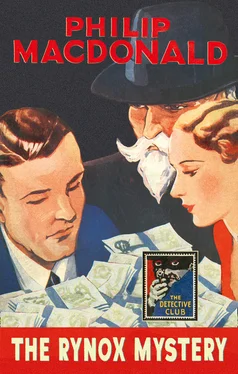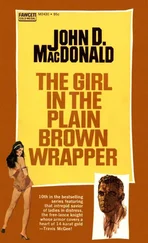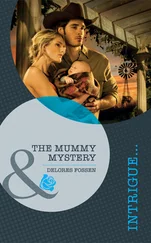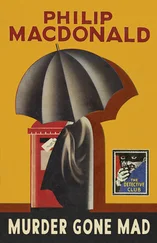Woolrich moved over to the big chair at the far side of the desk. He was a tall and broad-shouldered and exquisitely-dressed person of an age difficult to determine. He might have been anything between twenty-five and forty. Actually he was thirty-six. His tan was as deep almost as F. X.’s own, and his ash-blond hair was bleached by the sun and open air … but under the startlingly blue eyes were dark and lately almost permanent half-moons.
‘Look here, Woolrich!’ F. X. leaned forward. ‘I’ve just been looking over this last lot of reports from Lisbon. I expect you’ve read ’em.’
Woolrich nodded. ‘I think,’ he said, ‘I could say them over by heart.’
‘You mean,’ said F. X., ‘you know you could … Look here, there’s only one thing that worries me, and that’s Montana. You know and I know that Montana’s not square—unless it pays him to be—and is it paying him?’
Woolrich nodded. He said, with emphasis:
‘It is. If he went over to real rubber he’d never get the money. There aren’t any flies on Montana. You know that, sir, and he must realise that if he started any double-crossing he might do well for a bit but in the long run he’d get ditched. I’ve thought it all out.’
‘That,’ said F. X., ‘is my opinion too … All right, we’ll leave that at that. Now …’
They plunged into many and intricate details of business. They did, in ten minutes, so used were they to each other, as much work as most other couples in London, standing in the same relation, would have spent two hours and more upon.
F. X. rose and stretched himself. His big body seemed suddenly to tower. He said:
‘Well, that’s that! Anything else, Woolrich?’
Woolrich pondered a moment. His blue eyes narrowed as he thought and one corner of his well-cut, clean-shaven mouth twitched to a little constricted grin of concentration. At one corner of this mouth there showed a gleam of teeth as white as F. X.’s own. He pulled out a small notebook; flipped over its pages.
‘Nothing today, sir.’
‘You don’t want,’ said F. X., looking at him keenly, ‘to go down to the country this afternoon?’
A dark flush darkened Woolrich’s tan. He shook the blond head. ‘No, sir.’ He stood up. ‘If there’s nothing else I’ll go and have a bite of lunch. Busy afternoon after what we’ve done.’
F. X. nodded. ‘No, there’s nothing else.’
Woolrich walked to the door. With his fingers on its handle he turned. He said:
‘By the way, sir, I hear that fellow Marsh has been ringing up—’
‘Oh, him!’ said F. X. ‘That was before you came … All right, don’t blush. I meant to tell you, Woolrich, I’ve made an appointment with Marsh for tomorrow night. I’m going to meet him after all. And I’m going to settle with him.’
Woolrich came away from the door, back into the centre of the room.
‘Good Lord, sir!’ he said. ‘You don’t mean to say you’re going to—’
F. X. shook his head. ‘No, no, no! Woolrich, I’m not wringing wet—you know that. No, I’m going to tell Mr Marsh that if he likes to take a little douceur he can buzz off; if he doesn’t like to take it, he can buzz off just the same. I’m fed up with him … And if after tomorrow he ever rings up or shoves his face in here again, you can have him buzzed off with my love. Anyhow, we don’t want things like that blocking up the place.’
Woolrich paused on his journey to the door. He said:
‘I’ve never seen him, sir, and I don’t want to. But from what you said I should imagine you’re right.’
‘I am!’ said F. X., with feeling. ‘Anthony here yet?’
‘I’ll send him along, sir,’ said Woolrich, and was gone.
3
Francis Xavier Benedik and Anthony Xavier Benedik stood expectant just within the main doors of the Alsace Restaurant. They were waiting for Peter. Peter Rickforth was Samuel Harvey Rickforth’s daughter and did not look it. She was also—or perhaps primarily—the future wife of Anthony Xavier Benedik. She was very, very easy to look at. Her engagement to Tony Benedik had broken, at least temporarily, more hearts than any feminine decision in London for the past six months.
Peter was always late. Tony looked at F. X. ‘I think,’ said Tony, ‘another little drink.’
‘That’ll be three,’ said his father.
‘Right-ho, if you say so!’
They drank standing, their eyes fixed upon the revolving doors through which Peter would presently come. Standing there, utterly unconscious of their surroundings, glasses in hands, they were a couple which brought the gaze of many eyes to bear upon them. Exactly of a height, exactly of a breadth, with the same rather prominent-jawed, imperious nosed, hard-bitten good looks, the same deep, wide shoulders and narrow horseman’s hips, they were a walking, talking proof that heredity is not an old wife’s tale. What lineage, God knows, for F. X. himself could scarcely tell you from whence he came, but wherever this was, it and his own life had stamped their stamp upon the man, and this stamp was upon the son. They did not, these two, behave like father and son. They were more like elder and younger brother—much more. In only one particular was their aspect different. In the dress of F. X. was a careless, easy mixture of opulent cloth and ‘I-like-a-loose-fit-blast-it-what-do-clothes-matter?’ carelessness. In the dress of Tony was a superb and apparently unconscious elegance.
The revolving doors revolved. The little negro page-boy smiled until his face looked like an ice pudding over which chocolate has unevenly flowed.
‘Mawnin’, miss!’ said the page-boy.
‘’Morning, Sambo!’ said Peter Rickforth. She looked about her. She did not have far to look. Father and son were straight before her. She came towards them with her hands outstretched.
‘My dears,’ she said, ‘do not—do not say all those things which are trembling on your tongue and shooting darts of fire from your too amazingly similar pairs of eyes! I’m sorry! I’m sorry! And I’m sorry! How’s that?’
‘Very well,’ said F. X. ‘In fact, Peter, I think you are too well-mannered. After all, you know, any couple of men ought to be only too damn glad for you to lunch with them at all, let alone worry if you’re a few minutes late.’
‘Few minutes!’ said Tony. ‘Few minutes! If you do this, my girl, after we’re married, you’ll only do it once. At least, only once a month.’
Peter’s golden eyes stared at him. ‘Only a month? Why only once a month? Why not once a week?’
‘The effects,’ said Tony, ‘of the beatings will last three weeks, five days and seven hours exactly. We’ve got a table. Shall we go in, F. X.?’
‘If,’ said his father, ‘the lady wills.’
The lady did will, and presently they sat, a trio to draw all eyes, over a meal which was probably for that one day at least the best of its kind in all London.
It was over coffee that F. X. said:
‘Peter, I want to talk to you about your family.’
Peter laughed. ‘Family, sir?’ she said. ‘It’s the first I know about it!’
‘I mean,’ said F. X., ‘the other way round, backwards. Your father.’
‘Oh, Daddy !’ said Peter. ‘What’s he been doing? You don’t mean to tell me that squinting one in the Palazzo chorus has been getting Daddy into trouble, do you? She does squint, you know. She’s got the most awful cast in one eye!’
‘My good girl,’ said Tony, ‘you want a twisted snaffle in that mouth of yours.’
‘Your father, Peter,’ said F. X., ‘said nothing to me about squinting Palazzo’s. Nothing at all. He wouldn’t. He might think I’d take a fancy to them. I’m worried about your father’—his smile was gone now—‘because your father is getting worried about RYNOX.’
Читать дальше












